Strategic Guide to ERP Implementation Process in Aircraft Manufacturing
 14 November 2023
14 November 2023In the dynamic realm of aircraft manufacturing, the strategic implementation of Enterprise Resource Planning (ERP) systems marks a pivotal shift towards enhanced efficiency and innovation. As a cornerstone in modern manufacturing, ERP unites various business processes, revolutionizing the aerospace industry with its ability to seamlessly integrate operations, from supply chain management to quality control.
This comprehensive guide delves into the nuances of ERP implementation, exploring its transformative impact on aerospace production. We uncover how ERP solutions optimize workflows, ensure regulatory compliance, and foster strategic growth in this highly specialized sector, establishing ERP as an indispensable tool for contemporary aerospace manufacturing excellence.
Examining the Role of ERP in Enhancing Aircraft Manufacturing Processes
In the fast-evolving world of aircraft manufacturing, staying ahead of technological advancements and operational efficiencies is not just an option, but a necessity. At the heart of this transformation is the implementation of Enterprise Resource Planning (ERP) systems. ERP implementation in the aerospace sector is no longer a trend but has become a strategic imperative for businesses seeking sustainable growth and operational excellence.
ERP systems integrate various business processes, enabling aircraft manufacturers to streamline operations, enhance productivity, and adapt to the ever-changing market demands. The significance of ERP in manufacturing, particularly in the specialized field of aerospace, cannot be overstated. It’s a pivotal tool that harmonizes every facet of the manufacturing process – from supply chain management to quality control and compliance, paving the way for a more efficient, agile, and competitive business model.
The Strategic Benefits of Implementing ERP in the Aerospace Sector
Aerospace ERP strategies encompass more than just the installation of software. They represent a comprehensive approach towards operational transformation. The adoption of ERP in this sector is driven by the need to manage complex manufacturing processes, comply with stringent regulatory requirements, and meet the escalating expectations of quality and efficiency.
The strategic benefits of ERP implementation in aircraft manufacturing are manifold. They include enhanced coordination of complex manufacturing processes, real-time data analysis for informed decision-making, streamlined supply chains, and improved customer service. Furthermore, integrated erp software systems facilitate better project management and workforce planning, ensuring that resources are optimally utilized.
In essence, ERP implementation in the aerospace sector is not just a technological upgrade; it’s a strategic move towards future-proofing businesses in an increasingly competitive and demanding industry.
As we delve deeper into the transformative impact of ERP in aircraft manufacturing, it’s crucial to recognize the potential of such systems in elevating your business. If you’re considering ERP implementation project or enhancing your current setup, our project team at Attract Group is ready to guide you through every step.
ERP Implementation Project: The Strategic Imperative
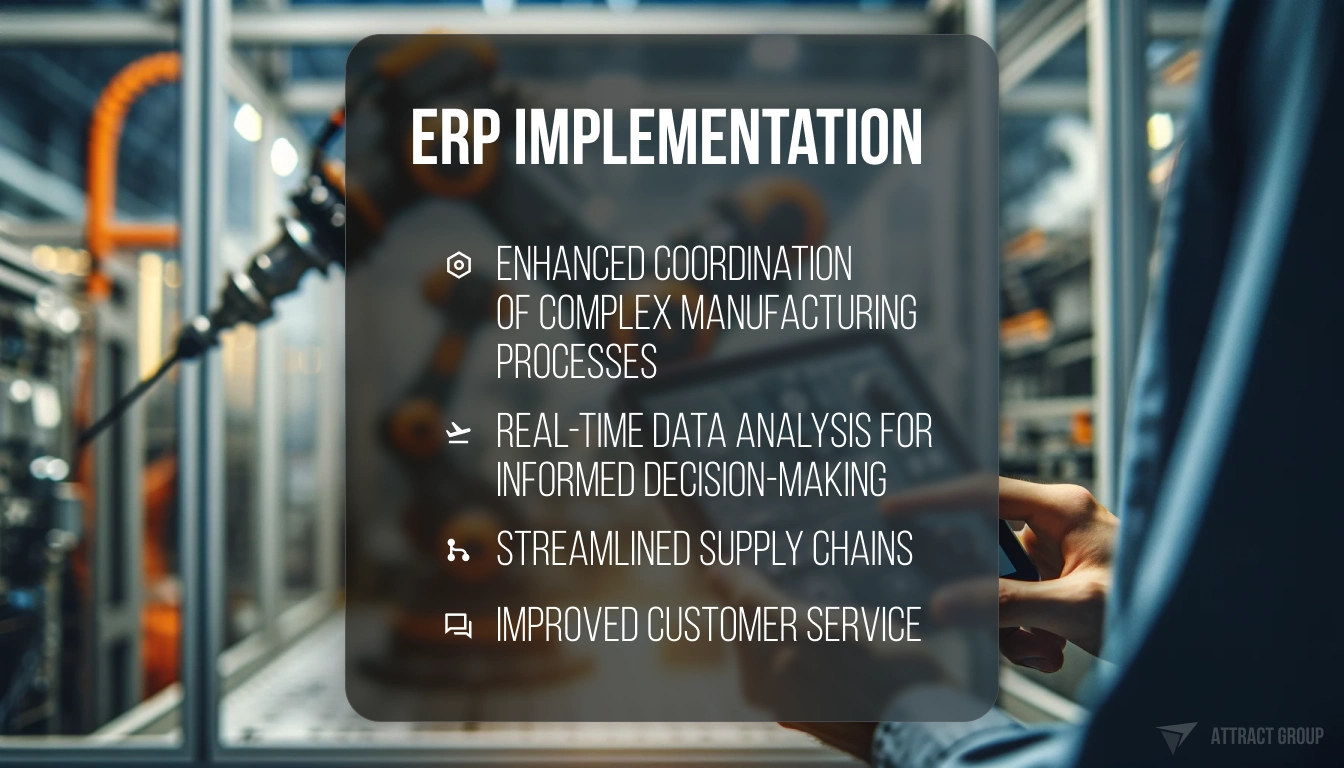
Unpacking the Concept of ERP and Its Criticality in Manufacturing
Enterprise Resource Planning (ERP) systems are a cornerstone in the landscape of modern manufacturing. In essence, ERP is a suite of integrated applications that a company uses to collect, store, manage, and interpret data from various business activities. It’s an umbrella that covers everything from procurement, project management, to supply chain operations.
For the aerospace sector, the implementation of ERP is not just about technology adoption but a transformative strategy. The complexity of aircraft manufacturing, with its myriad of intricate parts and rigorous safety standards, necessitates a system that can seamlessly integrate various processes. ERP solutions bring together disparate elements of manufacturing, ensuring a cohesive workflow that enhances efficiency and reduces errors.
The Driving Forces Behind ERP Adoption in the Aerospace Industry
The aerospace industry is marked by its high stakes and precision requirements. Here, the margin for error is negligible. Factors implement a new erp system include:
- Complex Supply Chain Management: Aerospace manufacturers deal with a vast network of suppliers. ERP System offer tools for better supply chain visibility and coordination.
- Regulatory Compliance: With stringent regulations in the aerospace sector, ERP helps in maintaining compliance and recording necessary documentation.
- Demand for Efficiency: In an industry where delays can cost millions, ERP systems ensure timely and efficient project completion.
Enterprise Resource Planning Fundamentals
Core Components and Functionalities of an ERP System
At its core, an ERP system integrates various business processes into one complete system to streamline processes and information across the organization. Key components include:
- Finance and Accounting: Budgeting, financial reporting, accounts payable/receivable.
- Human Resources: Payroll, training, benefits administration.
- Manufacturing and Production: Product lifecycle management, shop floor management.
- Supply Chain Management: Inventory control, order processing, procurement.
- Customer Relationship Management (CRM): Sales management, customer support.
Contact us for a tailored ERP solution that aligns with your specific manufacturing needs
Aligning Aerospace Manufacturing Needs with ERP Capabilities
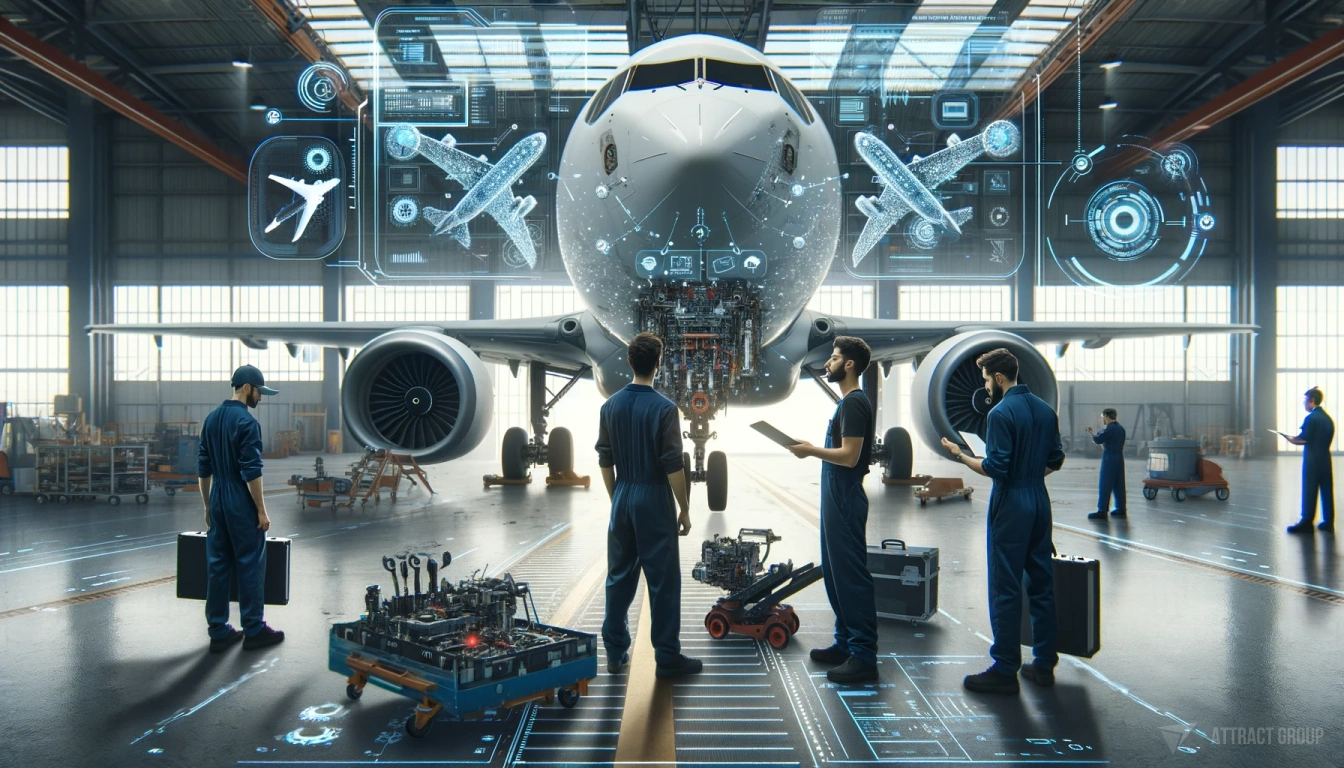
Aerospace manufacturing demands a high degree of precision and coordination. An ERP system for this sector needs to be robust enough to handle complex manufacturing processes, adhere to safety and quality standards, and be flexible enough to adapt to changing technologies and market demands. Key aspects to consider in erp project include customization to specific aerospace requirements, scalability, and integration capabilities with other technologies and systems.
Aerospace ERP Implementation Process
Tailoring ERP Implementation Process to Fit Aerospace Production Demands
Implementing ERP in the aerospace sector requires a tailored approach. Strategies should consider the unique challenges of aircraft manufacturing such as long product lifecycles, complex supply chains, and the need for strict regulatory compliance. It’s essential to balance the customization of the ERP system to specific aerospace needs while maintaining the standardization necessary for streamlined operations.
Balancing Customization with Standardization in ERP Solutions
Customization allows for the ERP system to be fine-tuned to the specific needs of the aerospace sector, such as unique manufacturing processes, supply chain logistics, and regulatory compliance. However, too much customization can lead to increased costs and complexity. Standardization, on the other hand, offers the benefits of proven best practices, easier updates, and support. The key is to strike a balance that leverages the strengths of both approaches.
The Benefits To Implement ERP Systems in Manufacturing
Exploring the Multifaceted Benefits of ERP in Aerospace Manufacturing
Implementation of an ERP system in aerospace manufacturing brings a myriad of benefits, such as:
- Enhanced Operational Efficiency: Streamlined processes reduce delays and increase productivity.
- Improved Data Accuracy and Decision-Making: Real-time data and analytics aid in more informed decision-making.
- Cost Reduction: Optimized resource management leads to significant cost savings.
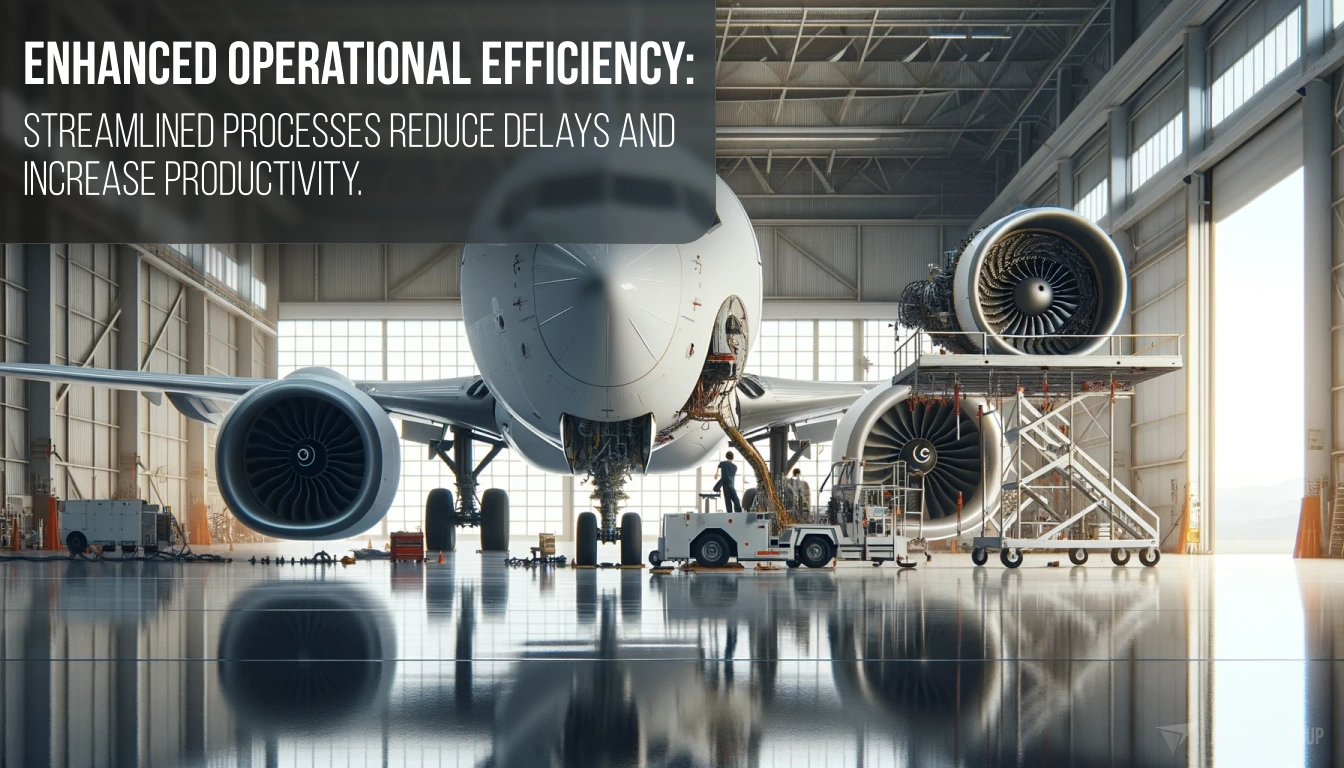
Case Studies of Increased Efficiency and Productivity Post-ERP Integration
Case studies in the aerospace sector demonstrate the tangible benefits of ERP software implementation. For instance, a major aerospace manufacturer reported a 20% increase in production efficiency post-ERP integration.
Table: ERP Implementation Impact in Aerospace Manufacturing
| Aspect | Pre-ERP Scenario | Post-ERP Implementation |
|---|---|---|
| Production Efficiency | Inconsistent | Increased by 20% |
| Supply Chain Management | Fragmented | Streamlined |
| Regulatory Compliance | Challenging | Simplified |
| Cost Management | Less Controlled | Optimized |
We can assist you in achieving operational excellence!
Optimizing Aerospace Production with ERP Software
ERP systems in aerospace manufacturing optimize production workflows by integrating various aspects of manufacturing into a cohesive system. This integration allows for better scheduling, resource allocation, and workflow management, ultimately leading to enhanced productivity and reduced time-to-market.
How ERP Systems Streamline Aerospace Production Workflows
Effective ERP implementation involves techniques such as:
- Centralized Data Management: One source of truth for all supply chain information.
- Automated Workflows: Reduce manual processes and increase efficiency.
- Real-Time Analytics: For proactive decision-making in supply chain management.
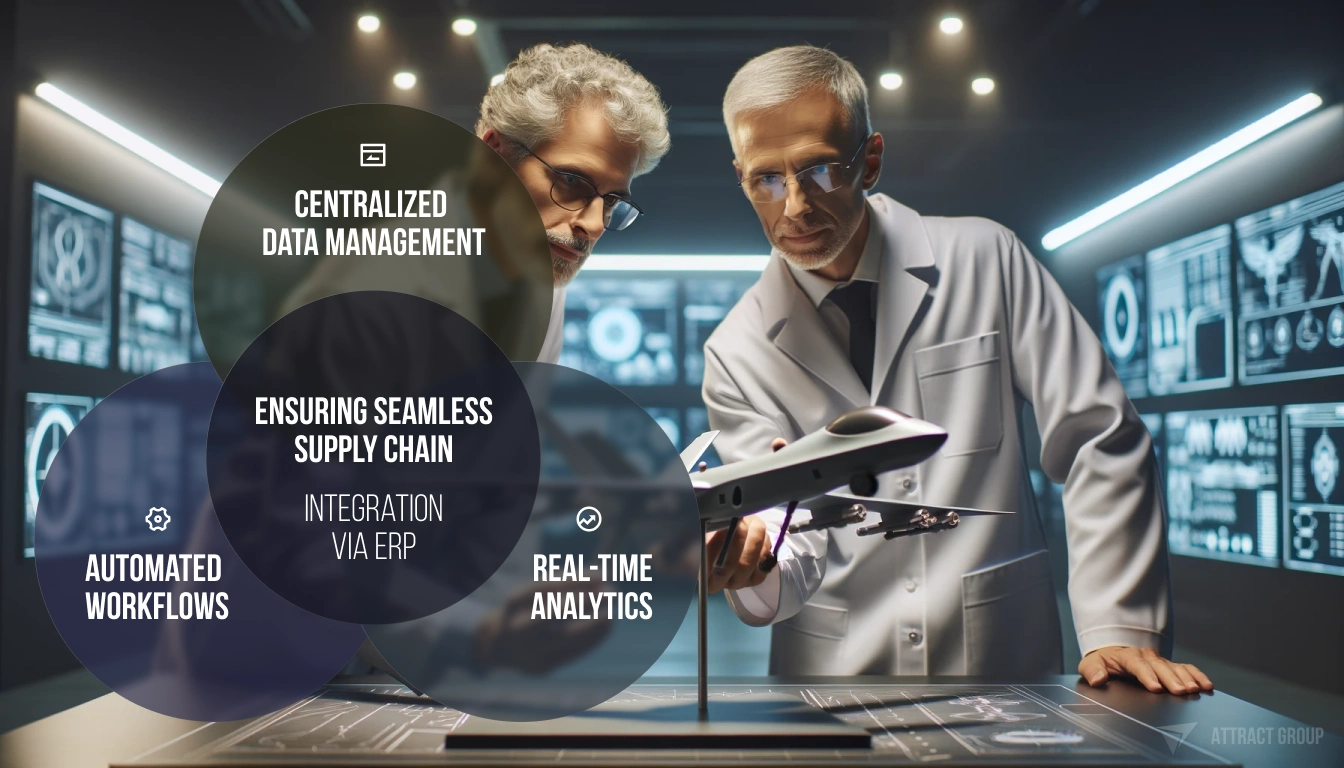
Quality Control and Compliance in ERP Project
Quality control is paramount in aircraft manufacturing. ERP systems support quality control by providing tools for tracking and monitoring every aspect of the production process. This ensures that each component meets the required standards and specifications, reducing the risk of errors and rework.
Navigating Regulatory Compliance within ERP Frameworks
Aircraft manufacturing is heavily regulated, and ERP systems help manufacturers navigate this complex landscape. They offer features for tracking compliance requirements, maintaining necessary documentation, and ensuring that all processes are in line with regulatory standards.
Step-by-Step: Planning and Executing an ERP Implementation in Aerospace Manufacturing
A successful ERP implementation in aerospace manufacturing involves several key steps:
- Assessment and Planning: Understanding specific needs and preparing right implementation plan.
- System Selection: Choosing an ERP system that fits the unique requirements of aerospace manufacturing.
- Customization and Integration: Tailoring the system to specific needs and integrating it with existing processes and systems.
- Training and Testing: Ensuring that staff are adequately trained and the process of planning is thoroughly tested before going live.
Steps in the ERP Implementation Project
| Step | Description |
|---|---|
| 1. Needs Assessment | Evaluating the specific requirements of the aerospace manufacturing business. |
| 2. ERP System Selection | Choosing an ERP system that aligns with the business’s needs and objectives. |
| 3. Implementation Planning | Developing a comprehensive plan covering all aspects of the ERP deployment. |
| 4. Customization and Configuration | Tailoring the ERP system to fit the unique processes and workflows. |
| 5. Data Migration | Transferring existing data to the new ERP system in a secure and efficient manner. |
| 6. Testing | Thorough testing of the ERP system to ensure functionality and performance. |
| 7. Training and Change Management | Educating employees on the new system and managing the transition process. |
| 8. Go-Live and Evaluation | Launching the ERP system and assessing its performance and impact. |
Best Practices for Managing Change During the ERP Adoption Phase
Change management is crucial for a smooth transition to a new ERP system. Best practices include:
- Effective Communication: Keeping all stakeholders informed about the changes and benefits.
- Employee Involvement: Engaging employees in the process to gain their support and input.
- Continuous Support and Training: Providing ongoing support and training to ensure successful adoption.
Supply Chain Integration and Management
ERP systems improve supply chain visibility by providing real-time data on inventory levels, supplier performance, and logistics. This enables better coordination and collaboration with suppliers, leading to more efficient and reliable supply chains.
Addressing Aerospace-Specific Supply Chain Challenges Through ERP Solutions
Aerospace supply chains face unique challenges such as managing long lead times, handling complex components, and complying with regulatory requirements. ERP systems address these challenges by providing tools for better planning, forecasting, and compliance management.
ERP System Benefits: Beyond the Production Line
The benefits of ERP systems extend beyond the production line, impacting various aspects of aerospace business operations such as:
- Improved Decision-Making: Access to real-time data and analytics aids in making more informed decisions.
- Enhanced Customer Service: Better inventory management and order processing lead to improved customer satisfaction.
- Operational Agility: ERP systems provide the flexibility to adapt to changing market conditions and business needs.
ERP’s Impact on Decision-Making, Customer Service, and Operational Agility
ERP systems empower aerospace manufacturers with the tools to make quicker, data-driven decisions, improve customer service by providing accurate and timely information, and adapt to new opportunities and challenges with greater agility.
Case Studies: ERP Implementation in Aerospace
Several aerospace companies have successfully implemented ERP systems, resulting in significant improvements in their operations. For example, a leading aerospace manufacturer experienced a 30% reduction in operational costs and a 25% increase in customer satisfaction rates after ERP implementation.
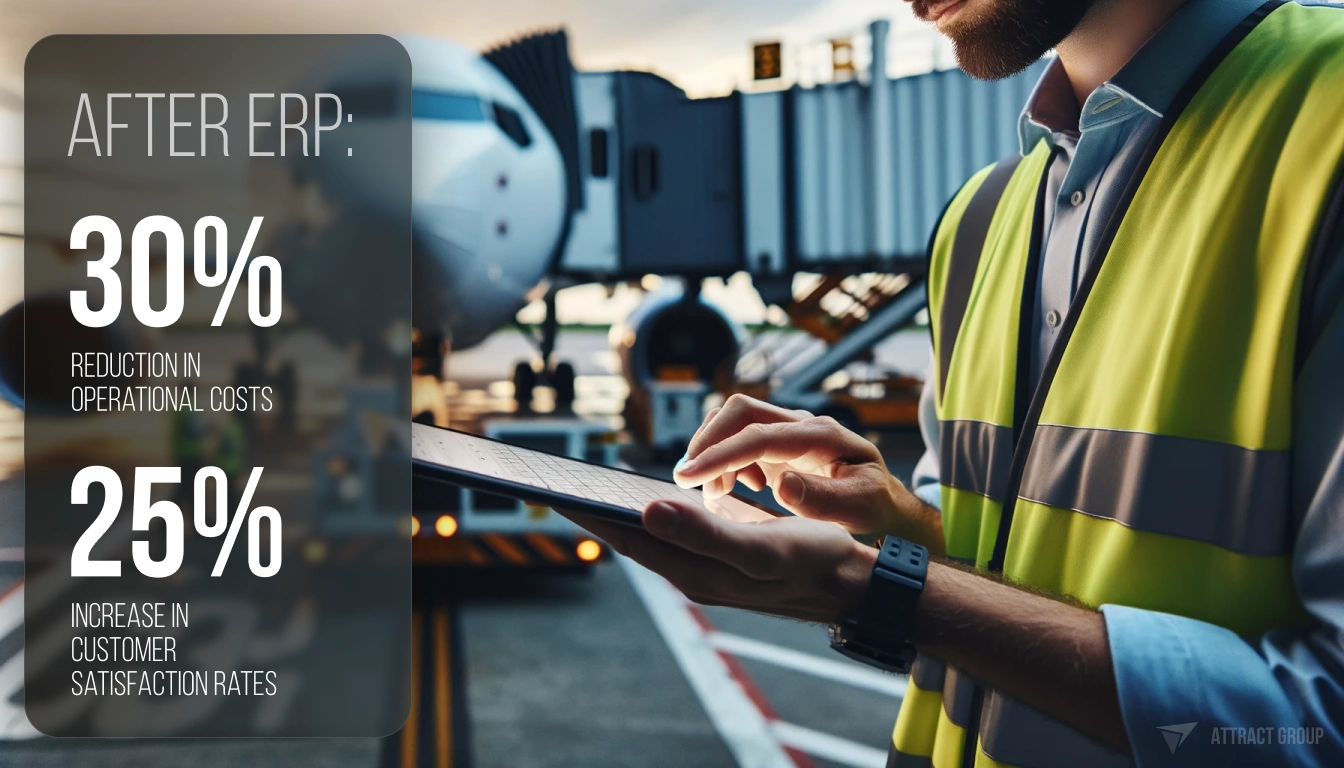
Lessons Learned and Insights Gleaned from Real-World Applications
Key lessons from these case studies include the importance of thorough planning, the need for customization to specific aerospace requirements, and the value of involving all stakeholders in the implementation process.
Conclusion
In conclusion, the implementation of ERP systems in aircraft manufacturing is a strategic move that brings substantial benefits across the entire spectrum of operations. From enhancing efficiency and productivity to ensuring regulatory compliance and improving decision-making, ERP systems are pivotal in driving the aerospace sector towards sustainable growth and competitive edge.
The Way Forward: Embracing ERP for Sustained Aerospace Manufacturing Excellence
As the aerospace industry continues to evolve, the adoption of ERP systems will play a crucial role in shaping its future. By embracing ERP, manufacturers can position themselves at the forefront of innovation, efficiency, and excellence.
Discover how we can assist you in implementing a cutting-edge ERP system
FAQs
What is ERP Implementation in the Context of Aircraft Manufacturing?
ERP implementation in aircraft manufacturing refers to the process of adopting and integrating Enterprise Resource Planning systems to streamline and optimize various manufacturing and business processes. It involves configuring the ERP software to meet the specific needs of aircraft production, supply chain management, quality control, and compliance.
How Long Does an ERP Implementation Process Typically Take?
The ERP implementation process can vary in duration, typically ranging from several months to a couple of years. The timeframe depends on the complexity of the business processes, the size of the organization, and the level of customization required. It’s essential to have a well-structured implementation plan and a dedicated project team to ensure a smooth transition.
Can ERP Solutions Be Customized for Aerospace Production Optimization?
Absolutely. ERP solutions can be tailored to address the unique challenges and requirements of aerospace production optimization. Customization can involve configuring the software to handle specific aerospace manufacturing processes, compliance needs, and supply chain management strategies.
What Are the Primary Benefits of an ERP System in Manufacturing?
ERP system benefits in manufacturing include improved operational efficiency, enhanced data accuracy, streamlined business processes, better resource planning, and cost savings. In the context of aerospace, these systems are crucial for maintaining high-quality standards, ensuring compliance, and managing complex supply chains.
How Does ERP Aid in Aerospace Supply Chain Integration?
ERP plays a vital role in supply chain integration by providing a centralized platform for managing all aspects of the supply chain. This integration facilitates better communication, real-time data sharing, and more efficient coordination with suppliers, leading to improved supply chain responsiveness and reliability.
What Quality Control Management Features Does ERP Offer?
ERP systems offer comprehensive quality control management features such as tracking and monitoring of production processes, real-time quality checks, compliance management, and traceability of materials and components. These features are essential in ensuring that aerospace products meet the stringent quality standards of the industry.
What Should Be Considered for Successful ERP Adoption?
For successful ERP adoption, factors to consider include clear understanding of business requirements, choosing the right ERP software, effective change management, thorough training for users, and continuous support. A strategic implementation approach is crucial for ensuring that the ERP system aligns with the organization’s objectives and delivers the intended benefits.
How Does ERP Contribute to Compliance with Aerospace Regulations?
Compliance with ERP systems in the aerospace industry involves leveraging the software to manage and track regulatory requirements, ensure accurate reporting, maintain necessary documentation, and monitor compliance across all business processes. ERP systems are designed to help manufacturers adhere to industry-specific regulations and standards.
Are There Any Notable ERP Implementation Case Studies in the Aerospace Industry?
Yes, there are several notable ERP implementation case studies in the aerospace industry that highlight the transformative impact of ERP systems. These case studies often demonstrate significant improvements in efficiency, cost savings, compliance management, and overall operational effectiveness post-ERP implementation.
What Is the Role of the Project Team in an ERP Implementation?
The project team in an ERP implementation plays a crucial role in planning, coordinating, and executing the implementation process. This team typically includes members from various departments, IT professionals, and possibly external consultants. Their responsibilities involve ensuring that the implementation aligns with business objectives, managing resources, and facilitating communication among stakeholders.
How Do Modern ERP Systems Differ from Traditional Ones?
Modern ERP systems differ from traditional ones in terms of technology, flexibility, and functionality. Modern ERPs often utilize cloud-based platforms, offer greater scalability, provide advanced analytics, and support more integrations with other business tools. They are designed to adapt to the evolving needs of businesses in a rapidly changing technological landscape.
What Challenges Might Arise During the Process of Installing an ERP Software System?
The process of installing an ERP software system can present challenges such as resistance to change among employees, data migration complexities, customization difficulties, and aligning the ERP system with existing business processes. Effective planning, communication, and training are key to overcoming these challenges.
How Does an ERP Implementation Process Timeline Influence the Overall Success?
The ERP implementation timeline is a critical factor in the success of the project. A well-planned timeline ensures that adequate time is allocated for each phase of the implementation, including planning, development, testing, and deployment. A realistic and well-managed timeline helps in avoiding rushed decisions and ensures thorough testing and training.
What Are the Key Components of an ERP Implementation Methodology?
An ERP implementation methodology typically includes several key components such as project planning, requirement analysis, system design and customization, data migration, testing, training, go-live preparation, and post-implementation support. Each component plays a vital role in the systematic and successful implementation of the ERP system.










